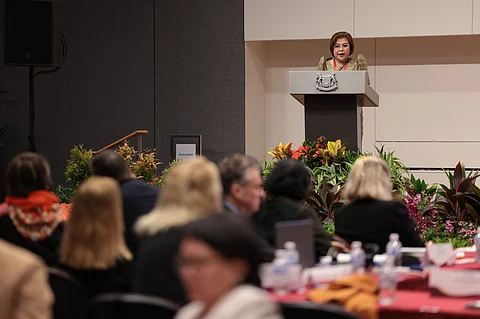
- NEWS
- the EDIT
- COMMENTARY
- BUSINESS
- LIFE
- SHOW
- ACTION
- GLOBAL GOALS
- SNAPS
- DYARYO TIRADA
- MORE

A delegation of Philippine judges and court officials, led by Supreme Court Associate Justice Amy C. Lazaro-Javier, took part in a series of international judicial meetings in Singapore focused on cross-border family disputes and child protection.
The group joined the 4th Global Meeting of the International Hague Network of Judges (IHNJ), held recently.
More than 50 judges from 34 member countries of the Hague Conference on Private International Law (HCCH) participated in the three-day event, which served as a venue to exchange practices in handling international cases of child abduction, custody, and support.
The Philippine delegation included Court of Appeals Associate Justice Angelene Mary W. Quimpo-Sale; Regional Trial Court Judges Sita Jose Clemente (Malolos), Maria Josefina San Juan-Torres (Morong), and Sittie Laarni R. Umpa (Marawi); Supreme Court Deputy Clerk of Court Atty. Laura del Rosario; and lawyers Marchellene Caday-Atitiw and Edrea Jean Ramirez.
Judge Clemente shared recent efforts in the Philippines to address cross-border child abduction, citing the 2022 issuance of Department of Justice Circular No. 010, which outlines procedures for the return of children taken abroad, and the Supreme Court’s administrative ruling (A.M. 22-09-15-SC) implementing the Hague Convention on Child Abduction.
The updated Rule on Family Mediation, issued in November 2024, was also discussed. It includes provisions for mediation in international custody, visitation, and support cases involving Filipinos and foreign nationals.
Justice Quimpo-Sale co-moderated a session with US Judge Hiram Puig-Lugo on the roles of IHNJ judges, focusing on judicial communication and overlapping asylum and return proceedings.
The delegation also attended the HCCH Judicial Roundtable and the 3rd ASEAN Family Judges Forum — marking the first joint session between IHNJ and ASEAN family court judges — held at the Supreme Court of Singapore.
Justice Lazaro-Javier, who serves as co-chairperson of the Council of ASEAN Chief Justices (CACJ) Working Group on Cross-Border Disputes Involving Children, discussed ongoing regional initiatives.
These include a Country Profile tool mapping mediation options across ASEAN states, a shared Code of Ethics for Mediators, and a compendium of frameworks on ethical and procedural standards.
She also said that a list of accredited Philippine family mediators will soon be accessible via the ASEAN Judiciaries’ Portal to support regional dispute resolution.
The CACJ meetings concluded with discussions on applying therapeutic justice to family cases and the possibility of developing a shared ASEAN approach to cross-border child-related disputes.
